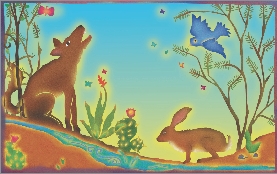Language and Grammar, continued
1 TRY OUT LANGUAGE
2 LEARN GRAMMAR
3 APPLY ON YOUR OWN
Use Forms of the Verbs Be and Have
The verbs be and have have special forms to tell about the present.
| Forms of Be | Negative |
|---|---|
| I am | I’m not |
| you are | you aren’t |
| he, she, or it is | he, she, or it isn’t |
| we are | we aren’t |
| they are | they aren’t |
| Forms of Have | Negative |
|---|---|
| I have | I don’t have |
| you have | you don’t have |
| he, she, or it has | he, she, or it doesn’t have |
| we have | we don’t have |
| they have | they don’t have |
Use the correct form of the verb.
| EXAMPLES | Forms of be | |
|---|---|---|
| Present: | The rabbit is more like a human in tales. | |
| Negative: | He isn’t exactly like an animal. | |
| EXAMPLES | Forms of have | |
| Present: | The rabbit has human traits in tales. | |
| Negative: | He doesn’t have many animal traits. |
Practice Together
Say each sentence. Then say it again and make the sentence negative.
1. I (am/are) interested in folk tales.
2. Most countries (have/has) folk tales.
3. Often, a folk tale (have/has) a lesson.
4. A hero (is/are) clever.
Try It!
Say each sentence. Write the negative form of the verb on a card. Then say the negative sentence.
5. The animals in folk tales (have/has) human traits.
6. The villains (is/are) evil.
7. Sometimes a folk tale (have/has) magic objects.
8. Usually, the stories (is/are) short.

A coyote and a rabbit are characters in a Mayan folk tale.